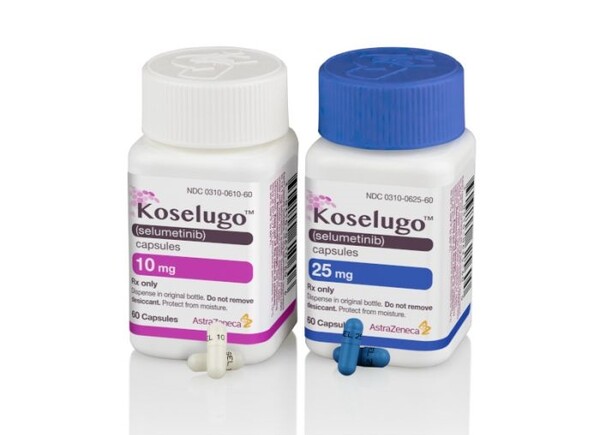AstraZeneca Korea said Tuesday that its rare disease treatment, Koselugo (selumetinib), will be covered by health insurance for the treatment of pediatric patients aged 3 to 18 years with neurofibromatosis type 1 with plexiform neurofibroma (PN) starting January 1, 2024.

Continuation of Koselugo reimbursement will be granted if there is at least a 20 percent reduction in the volume of the target lesion, compared to the baseline and six months post-dose.
In the SPRINT study, which was the basis for Koselugo's approval and reimbursement, 34 of 50 patients with neurofibromatosis type 1 with plexiform neurofibromas aged 3 to 18 years achieved a 20 percent or greater reduction in tumor size within three to six months of starting Koselugo.
The three-year progression-free survival (PFS) rate for the Koselugo-treated group was 84 percent, compared to only 15 percent for the untreated group.
Lee Beom-hee, Professor of Pediatric Endocrinology and Metabolism at Asan Medical Center, said that the neurofibromatosis type 1 with plexiform neurofibromas is a serious disease that is characterized by severe pain, blurred vision, and scoliosis, and can progress to a malignant form that poses a direct threat to life.
"These symptoms can appear as early as infancy and worsen with age, making early treatment essential, and we hope this reimbursement will help prolong the lives of pediatric patients and improve their quality of life," Lee added.
"We are very pleased that this reimbursement from Koselugo will bring new hope to children with neurofibromatosis type 1 in Korea, who have previously lacked treatment options other than large-scale therapy and surgery," said an AstraZeneca Korea official. "With Koselugo, AstraZeneca will continue to do our best to bring new hope and healthy lives to patients with rare diseases."
Related articles
- AZ’s severe asthma drug Tezspire scores nod in Korea
- AstraZeneca to pull anti-diabetes blockbuster Forxiga from Korea amid floods of generics
- AstraZeneca Korea appoints Chon Se-whan as Country President
- AstraZeneca Korea expands indication for Ultomiris to treat generalized myasthenia gravis
- AstraZeneca, HK inno.N team up to boost sales of diabetes drugs

